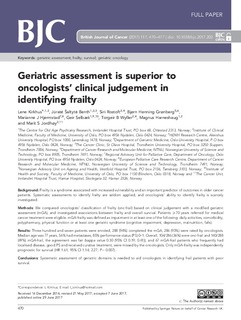| dc.contributor.author | Kirkhus, Lene | |
| dc.contributor.author | Saltyte Benth, Jurate | |
| dc.contributor.author | Kristjansson, Siri Rostoft | |
| dc.contributor.author | Grønberg, Bjørn Henning | |
| dc.contributor.author | Hjermstad, Marianne Jensen | |
| dc.contributor.author | Selbæk, Geir | |
| dc.contributor.author | Wyller, Torgeir Bruun | |
| dc.contributor.author | Harneshaug, Magnus | |
| dc.contributor.author | Jordhøy, Marit Slaaen | |
| dc.date.accessioned | 2018-01-19T16:06:44Z | |
| dc.date.available | 2018-01-19T16:06:44Z | |
| dc.date.created | 2017-07-12T13:07:04Z | |
| dc.date.issued | 2017 | |
| dc.identifier.citation | British Journal of Cancer. 2017, 117 (4), 470-477. | nb_NO |
| dc.identifier.issn | 0007-0920 | |
| dc.identifier.uri | http://hdl.handle.net/11250/2478443 | |
| dc.description.abstract | Background: Frailty is a syndrome associated with increased vulnerability and an important predictor of outcomes in older cancer patients. Systematic assessments to identify frailty are seldom applied, and oncologists’ ability to identify frailty is scarcely investigated. Methods: We compared oncologists’ classification of frailty (onc-frail) based on clinical judgement with a modified geriatric assessment (mGA), and investigated associations between frailty and overall survival. Patients X70 years referred for medical cancer treatment were eligible. mGA-frailty was defined as impairment in at least one of the following: daily activities, comorbidity, polypharmacy, physical function or at least one geriatric syndrome (cognitive impairment, depression, malnutrition, falls). Results: Three hundred and seven patients were enroled, 288 (94%) completed the mGA, 286 (93%) were rated by oncologists. Median age was 77 years, 56% had metastases, 85% performance status (PS) 0–1. Overall, 104/286 (36%) were onc-frail and 140/288 (49%) mGA-frail, the agreement was fair (kappa value 0.30 (95% CI 0.19; 0.41)), and 67 mGA-frail patients who frequently had localised disease, good PS and received curative treatment, were missed by the oncologists. Only mGA-frailty was independently prognostic for survival (HR 1.61, 95% CI 1.14; 2.27; P¼0.007). Conclusions: Systematic assessment of geriatric domains is needed to aid oncologists in identifying frail patients with poor survival. | nb_NO |
| dc.language.iso | eng | nb_NO |
| dc.publisher | Springer Nature | nb_NO |
| dc.rights | Navngivelse-Ikkekommersiell-DelPåSammeVilkår 4.0 Internasjonal | * |
| dc.rights.uri | http://creativecommons.org/licenses/by-nc-sa/4.0/deed.no | * |
| dc.title | Geriatric assessment is superior to oncologists’ clinical judgement in identifying frailty | nb_NO |
| dc.type | Journal article | nb_NO |
| dc.type | Peer reviewed | nb_NO |
| dc.description.version | publishedVersion | nb_NO |
| dc.source.pagenumber | 470-477 | nb_NO |
| dc.source.volume | 117 | nb_NO |
| dc.source.journal | British Journal of Cancer | nb_NO |
| dc.source.issue | 4 | nb_NO |
| dc.identifier.doi | 10.1038/bjc.2017.202 | |
| dc.identifier.cristin | 1482034 | |
| dc.description.localcode | Copyright The Author(s) 2017. This work is licensed under the Creative Commons Attribution-Non-Commercial-Share Alike 4.0 International License. To view a copy of this license, visit http:// creativecommons.org/licenses/by-nc-sa/4.0/. | nb_NO |
| cristin.unitcode | 194,65,15,0 | |
| cristin.unitname | Institutt for klinisk og molekylær medisin | |
| cristin.ispublished | true | |
| cristin.fulltext | original | |
| cristin.qualitycode | 2 | |

